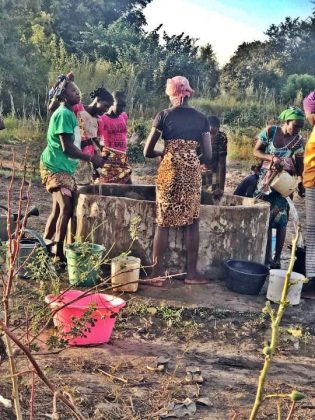This project is made possible through the partnership of WATER CHARITY and the NATIONAL PEACE CORPS ASSOCIATION. ![]()
Location
Bxxxxxx Kxxx, Jarra Central, Lower River Region, The Gambia
Community Description
Bxxxxxx Kxxx village contains approximately 450 people divided into 25 family compounds. The ethnicity is primarily Mandinka with a few Manjago and Fula individuals. The villagers practice subsistence farming producing groundnut as the main cash crop, coos, and rice. The village is within the Lower River Region which suffers substantial malnutrition. The farms are rain-fed, not irrigated, and are the primary food source for the families. Village women are traditionally the vegetable farmers who work the fields during the long dry season from October to June. Preparing the fields, planting, and harvesting are communal. The farms provide sustenance with the sparse surplus being sold for a profit.
Bxxxxxx Kxxx has a 5-classroom lower basic school offering Grades 1-6, including an Early Childhood Development (ECD) class. The neighboring village of Jappineh, approximately 5 kilometers away, provides access to continued education past Grade 6. Girls often drop out of school early, staying home to work with their mothers.
Problem Addressed
The farms are in need of an irrigation system and fencing to keep out animals that destroy the crops. The garden currently has one well that is not very deep and can run dry by the end of each day, refilling by the next evening. The men in the community recently dug a few small holes which women use to draw water by bucket, but the water supply is very limited and inconsistent and this caused the loss of some garden capacity. The community needs to improve productivity and food security. This will, in turn, improve the community’s economics and financially empower women.
Project Description
This project is to build a solar-powered borehole to provide a water source for the community garden.
The project will include: (1) Drilling a 6” borehole fitted with solar power; (2) Installing a network of pipes to supply water to four strategic locations of the garden; (3) Installing a perimeter fence; (4) Training women and girls about better vegetable production; (5) Providing financial management and group development training.
The PCV and the village counterpart will be working with the Village Development Committee (VDC), and the Village Garden Committee (VGC). The Village Garden Committee was created as a subcommittee of the VDC to centralize and focus the work to a smaller and more knowledgeable body of leaders. The Garden Committee led the project design, will facilitate the implementation, and manage the operation and maintenance of the project. The VDC headed by the Chairman will serve as the contracting authority. The Garden Committee will be responsible for mobilizing both local and external resources to successfully execute the project and ensure sustainability. The Garden Committee will perform oversight during the implementation to ensure that objectives and expected outcomes are met on time and on budget.
Project Impact
Approximately 450 people well benefit from the project.
Let Girls Learn
With an adequate water supply, approximately 50 women and girls will benefit from the additional technical and nutritional training. The women are the cultivators of the vegetable garden and the goal is to teach the women how to better support their families, especially their children, with the yields from the community garden. Young girls will be relieved of the responsibility to bring in water which will permit them to attend school.
Project Administration
Jasmine Stephens, Peace Corps Volunteer
Monitoring and Maintenance
Sustainability is key to making this project successful. The VDC and community have already proven they are invested in the solar tap project. They have designed and contracted the project out, raised $6,000, and fairly divided up the unskilled labor. Under the direction of the VDC and counterpart, specific people will be chosen for the water committee. Currently, it is being organized by the VDC, but the sub-committee will be trained with the help of the contractor and the Regional Water Resources team on maintaining the tap system, collecting monthly dues from the compound, and possibly extending the project as deemed necessary. The committee will also be trained by the PCV and counterpart on basic financial record keeping to ensure fees are being paid, funds are available, the cost of repairs are accurate, and that the committee is being accountable with the money.
The PCV near the site will monitor construction and do periodic evaluations.
Project Funding
Funds for this project have been advanced by an anonymous donor. Please click this Donate button to help us continue our work in The Gambia.